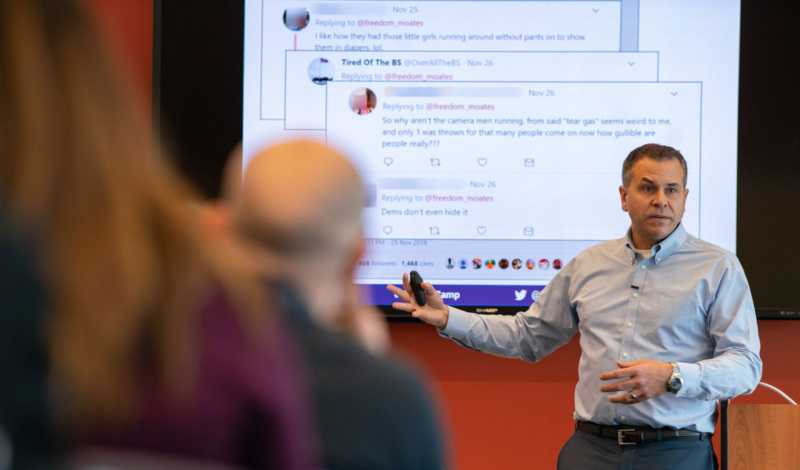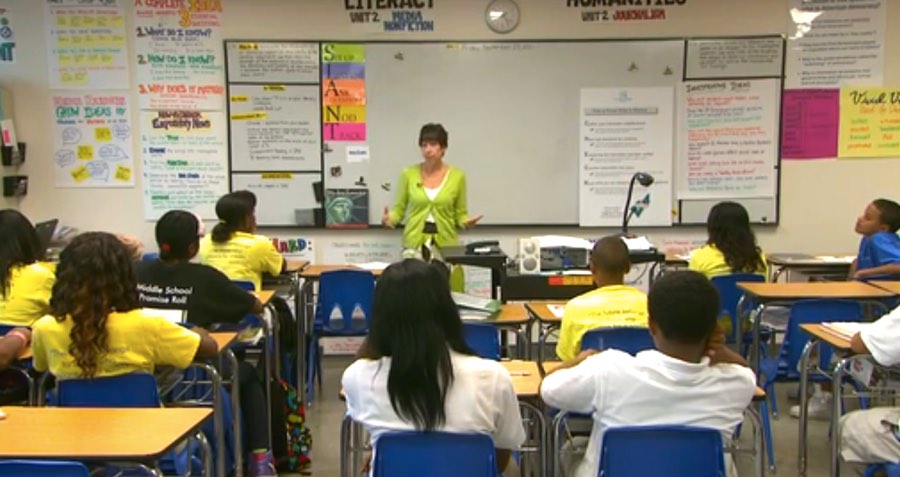



This column is a periodic series of personal reflections on journalism, news literacy, education and related topics by NLP’s founder and CEO, Alan C. Miller. Columns are posted at 10 a.m. ET every other Thursday.
The PBS NewsHour segment on the News Literacy Project had just aired.
“How was it?” my colleague asked me.
“Great for us,” I responded. “But I think PBS is going to have a problem with Fox.”
Little did I know that what was about to unfold would be a high-profile news literacy lesson itself.
On Dec. 13, 2011, the NewsHour aired a nearly seven-minute report on NLP, by senior correspondent Jeffrey Brown, that included an interview with me.
In one of the soundbites, I said that “in this hyperlinked information age … there is so much potential here for misinformation, for propaganda, for spin, all of the myriad sources of information out there.”
As I uttered the words “myriad sources of information out there,” a two-second visual illustration (“cover,” in broadcast parlance) appeared on screen — a screenshot of Bill O’Reilly of Fox News, an outspoken conservative and the host of The O’Reilly Factor, the most popular cable news program in the country. The NewsHour producers could easily have juxtaposed O’Reilly’s picture with a balancing shot of a left-leaning MSNBC host — but, for whatever reason, they didn’t.
Sure enough, my phone rang the next day. It was Juliet Huddy, a Fox News correspondent. She said O’Reilly was furious that PBS had attacked him, and she wanted me to comment.
After consulting NLP board members, I declined and suggested that Huddy seek comment from PBS, since its program had produced the piece. I also declined to respond to a far more insistent message left on my voicemail later that afternoon.
That evening, throughout his hour-long show, O’Reilly urged viewers to stay tuned to see how PBS had “attacked” The O’Reilly Factor.
His piece opened with my soundbite. O’Reilly responded in high dudgeon.
“Are you kidding me? Are you kidding me?” he said. “PBS showing my picture when talking about propaganda and misinformation? Good grief. Where can I sue?”
He then brought on Huddy. She described NLP and said it has “a great message.” She added that I had told her, “Look, I wasn’t involved in the editing,” and had referred her to PBS. She said she also spoke to the NewsHour producers.
“They didn’t apologize, right?” O’Reilly said, referring to me, the NewsHour producers and PBS. “OK, so now I’m going to hunt them down.”
Then he singled me out with a favorite pejorative, a term he reserved for “those who are doing awful, dumb, or evil things.”
“I don’t believe this pinhead for a moment who says he didn’t see the product before it went on,” he said as my photo was displayed on the screen. “Everything that goes on a national — you watch it before it goes on. All right? If your name is attached, you watch it.”
In fact, as O’Reilly surely knew, the subjects of television news reports do not usually see the piece in advance and, as Huddy sought to convey on my behalf (albeit unsuccessfully), I hadn’t, either.
I quickly discovered which friends and family members were fans of The O’Reilly Factor.
As soon as the show ended, my phone rang. It was a long-time friend. His first words: “Alan, you pinhead!”
Then my mother called. Her brother, my Uncle Melvin, had called her to ask if I was in trouble. “Bill O’Reilly is mad at Alan,” he told her.
I thought I might also hear from Huddy. Instead, two days later, I got a call from Michael Getler, the ombudsman (public editor) for PBS.
He asked if I had seen the NewsHour segment before it aired. When I said I hadn’t, he told me that he was writing a piece criticizing the program for its handling of O’Reilly’s photo and that the NewsHour was going to apologize to O’Reilly.
In the item that Getler posted that afternoon, he quoted Anne Bell, a NewsHour spokeswoman, saying that the segment about NLP included “several examples of a wide range of news outlets,” including Fox News, MSNBC and the BBC. “At no point,” Bell told Getler, “does the NewsHour pass judgment on the quality of any outlet shown.”
But, Getler wrote, “unless you were a cryptographer with laser vision, the only recognizable image was that of O’Reilly.”
“Miller, who had nothing to do with the editing or what was chosen to illustrate it, and Brown are both excellent and highly respected journalists,” Getler added. “But the picture of O’Reilly used by segment producers distracted from the otherwise excellent content.”
Ultimately, Getler wrote, he was told since O’Reilly was “the only visibly recognizable newsperson in the sequence,’’ the NewsHour apologized for the “unintended implication” that O’Reilly engages in “spin.”
Imagine.
This saga offers two compelling news literacy lessons. The first: Journalists must always be mindful and fair with even something as seemingly minor as a two-second visual. The second: PBS’s appointment of an ombudsman with the independence to criticize its programming (and prompt an apology) affirms its accountability to its editorial standards and practices.
On his Dec. 19 show, O’Reilly gleefully announced that PBS had apologized to him. “We accept PBS’s apology,” he said.
I am still waiting for mine from him.